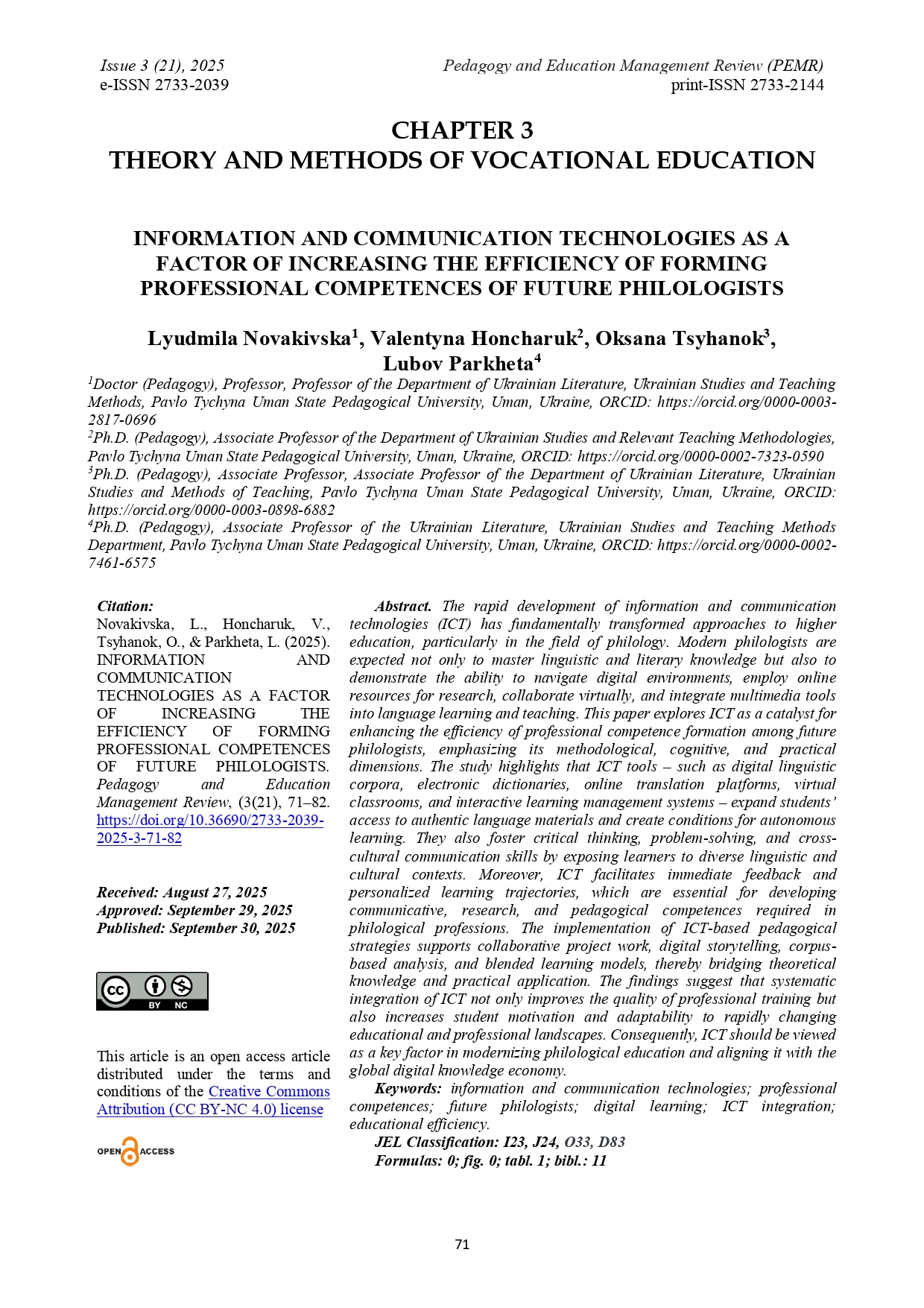INFORMATION AND COMMUNICATION TECHNOLOGIES AS A FACTOR OF INCREASING THE EFFICIENCY OF FORMING PROFESSIONAL COMPETENCES OF FUTURE PHILOLOGISTS
DOI:
https://doi.org/10.36690/2733-2039-2025-3-71-82Keywords:
information and communication technologies, professional competences, future philologists, digital learning, ICT integration, educational efficiencyAbstract
The rapid development of information and communication technologies (ICT) has fundamentally transformed approaches to higher education, particularly in the field of philology. Modern philologists are expected not only to master linguistic and literary knowledge but also to demonstrate the ability to navigate digital environments, employ online resources for research, collaborate virtually, and integrate multimedia tools into language learning and teaching. This paper explores ICT as a catalyst for enhancing the efficiency of professional competence formation among future philologists, emphasizing its methodological, cognitive, and practical dimensions. The study highlights that ICT tools – such as digital linguistic corpora, electronic dictionaries, online translation platforms, virtual classrooms, and interactive learning management systems – expand students’ access to authentic language materials and create conditions for autonomous learning. They also foster critical thinking, problem-solving, and cross-cultural communication skills by exposing learners to diverse linguistic and cultural contexts. Moreover, ICT facilitates immediate feedback and personalized learning trajectories, which are essential for developing communicative, research, and pedagogical competences required in philological professions. The implementation of ICT-based pedagogical strategies supports collaborative project work, digital storytelling, corpus-based analysis, and blended learning models, thereby bridging theoretical knowledge and practical application. The findings suggest that systematic integration of ICT not only improves the quality of professional training but also increases student motivation and adaptability to rapidly changing educational and professional landscapes. Consequently, ICT should be viewed as a key factor in modernizing philological education and aligning it with the global digital knowledge economy.
Downloads
References
Bialyk, O., Honcharuk, V. (2023). Professional training of the modern teacher in the conditions of distance education. Pedagogy and Education Management Review (PEMR), 1(11), 44–50. https://public.scnchub.com/perm/index.php/perm/issue/view/11/17
Bida, O., Oros, I., Chychuk, A., & Honcharuk, V. (2021). Components of entrepreneurial competence of future teachers. Acta Paedagogika Volynienses, 4, 28–33.
Bida, O., Oros, I., Honcharuk, V., & Tiutia, M. (2022). Development of the adult education system in different countries of the world. Scientific Notes of Vinnytsia Mykhailo Kotsiubynskyi State Pedagogical University. Series: Pedagogy and Psychology, 70, 98–103.
Chychuk, A. P., Honcharuk, V. V., & Kvasniuk, V. V. (2024). Development of information competence of specialists in the educational environment. Scientific Notes. Series: Pedagogical Sciences, 6, 43–47. https://doi.org/10.59694/ped_sciences.2024.06.043
Dekarchuk, M., Honcharuk, V., Yovenko, L., & Parakhnenko, V. (2023). Methodological basis of training students of higher pedagogical educational institutions for the organization and conduct of scientific and pedagogical research. Věda a Perspektivy, 11(30), 43–50. http://perspectives.pp.ua/index.php/vp/article/view/7431
Honcharuk, V. V., Honcharuk, V. A., & Davyskyba, V. V. (2022). Formation of digital competence of the pedagogue in the process of professional training. Pedagogy and Education Management Review, 2, 12–20. https://public.scnchub.com/perm/index.php/perm/article/view/91
Honcharuk, V., Rozhi, I., Dutchak, O., Poplavskyi, M., Rybinska, Y., & Horbatiuk, N. (2021). Training of future geography teachers to local lore and tourist work on the basis of competence approach. Revista Românească pentru Educaţie Multidimensională, 13(3), 429–447. https://lumenpublishing.com/journals/index.php/rrem/article/view/3834
Honcharuk, V. V., Honcharuk, V. A., Melnyk, O. V., Dekarchuk, S. O., Hedzyk, A. A., & Poshtaruk, L. I. (2022). Usage of distance education technologies in the process of innovative training of future teachers in institutions of higher education. In Moderní Aspekty Vědy (Vol. XXVI, pp. 128–140). Česká republika: Mezinárodní Ekonomický Institut s.r.o.
Honcharuk, V. V., Vitenko, V. A., Sobchenko, T. M., & Liulchak, S. Yu. (2021). Innovative processes in higher education of Ukraine: considering foreign experience. Scientific Journal of the National Pedagogical Dragomanov University. Series 5. Pedagogical Sciences: Realities and Perspectives, 80(1), 75–80.
Honcharuk, V. A., Podlevska, N. V., & Zhyvolup, V. I. (2021). Professional communicative competence in the system of professional training of future philologists. Scientific Notes. Series: Pedagogical Sciences, 194, 89–94. https://pednauk.cuspu.edu.ua/index.php/pednauk/article/view/792
Kuchai, O., Honcharuk, V., & Dushechkina, N. (2023). The use of web technologies in the training of chemistry teachers. Modern Information Technologies and Innovation Methodologies of Education in Professional Training: Methodology, Theory, Experience, Problems, 67, 44–51. https://doi.org/10.31652/2412-1142-2023-67-44-51







